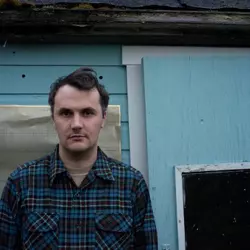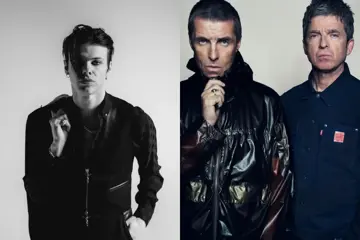 Mount Eerie
Mount EeriePhil Elverum's output, across The Microphones and, more recently, Mount Eerie, has seemed a work of exploration. Lo-fi rock clashes into ambient, soft folk makes way and black metal rises. Now on his latest releases, a pair of linked albums (Clear Moon and Ocean Roar), Elverum's voice often floats in a sea of droning ambience. Softly spoken and thoughtful, Elverum explains that he doesn't view this as a new element of the project, but something that he's been playing with since he first began creating.
“I was listening to some older stuff of mine recently, and I noticed those things in there,” he reflects. “And I'd forgotten that they were there before. Stuff from like ten-to-twelve years ago, that I was making in high school even. In fact, the first recordings that I did were more just drone-distortion experiments, not even songs really. And so I think that that element has always been there, even before I knew that it was called anything or knew that black metal was a thing. And so I think I gravitated towards listening to some of that music and being more overt about those influences recently, just because I found out about it, but I've always been interested in those extreme musical techniques.”
There's a tendency in drone and metal to expand an idea into a fifteen- or twenty-minute track. Elverum has always had an exceptional ear for pop though and it seems as though he's kept that sensibility when experimenting with these genres, continuing to encapsulate his ideas in two- to five-minute bursts that remain self-contained and catchy despite the underlying noise.
“Well, I recognise the value in these long tracks,” he muses, “because the function of that type of music, drone or extreme metal, is that it can be kind of transcendental and the effect is stronger when the track is fifteen minutes long. It more effectively takes your mind to another place. But when I'm recording and making music, it's hard for me to let myself sprawl out like that, just because it's asking a lot of people. I don't know, I feel shy or something. Also, since I have words in my stuff I feel like I can get my idea across and leave much quicker.”
Don't miss a beat with our FREE daily newsletter
A seriously hands-on musician, Elverum records the tracks himself, releases all of his work on his own label, designs covers for his LPs and has created the video to accompany Ocean Roar, the title track off the latest album. It's a lot of different creative outlets, but he says he doesn't feel a separation between them.
“I guess I don't really draw distinctions, very much, between them. I'm always working on something and it's all part of one big project. There are some things that I do that aren't part of that project, I suppose, like I draw some stupid joke comics that I don't really view as being part of Mount Eerie, but essentially it is, because it's still just me, the weird stuff that comes out of my brain. So I guess I must accept it as part of it. I guess I'm just following the creativity…” Elverum pauses and laughs gently at the last statement. “I sound super-hippy when I talk about it like this, but it's true. I feel creative and I make things.”
A few years ago, Elverum and a friend set up a studio in a giant room in an old Catholic church. He describes the acoustics as “amazing, if you like echo” and says that it suits Mount Eerie well, as he likes a big-sounding recording. Albums are often written in a fairly neutral environment, songs written in rehearsal rooms or hotels, designed around a rhythm or a melody rather than a space, but Elverum says that the new Mount Eerie albums have been strongly shaped by his studio.
“For the last two records, they were very much about doing experiments and exploring what worked well in the space. It was new so I tried a lot of things that didn't work and I threw away a lot of recordings. It was a lot of trial and error figuring out what went well there, and I'd imagine that whatever comes next will be the same. [When creating the sounds of the album] It's mostly curiosity, I guess; 'What would happen if I put the mic way over there and played this thing and then played this other sound through a speaker at the same time, but the speaker's way over here?'. Very little of it is actual effects; it's usually using space and distortion.”
The forms that Mount Eerie's songs take live continue that feeling of experimentation, as they shift from their album forms into something wholly different.
“I guess it happens kind of organically,” Elverum reflects. “It's a goal of mine to have it be different every time or to let the song inhabit many forms or whatever. I don't want to learn the song the way it is on the album and get it really tight and play it that way over and over. That seems kind of like killing it to me.”
As a recent example, Elverum has just performed a version of Ocean Roar for NPR, performed to an empty hall, the song taking on a chorale feel, something almost holy in the overlapping voices, stripped of effects. “We were on tour playing a full band version of that,” he explains. “But it was going to be an acoustic session, so we just brought the acoustic guitar and the singers, but we are playing versions of all the songs with lots of singing, overlapping harmony parts.”
The Australian tour will see yet again another version of the songs as the band is left behind and Elverum interprets his music as a solo musician again. Just as the recording space shapes his writing, Elverum says that the performance space shapes the way songs are played.
“It depends on the room and the people and the weather and the feeling of everyone in the room,” he says. “I try and pay attention to all those factors and make the performance more of an interactive living thing, rather than just a recital of something that I've practiced. Also, I play shows in rooms that aren't that big, so it's intimate, I'm able to hear what people are saying, or texting, or what conversation they're having over there on the side of the room. It's all part of it. When I'm singing on a stage, I feel like I'm trying to communicate, just in a weird way. By singing and playing music I'm trying to get an idea across. And so it seems like once I can't see the person in the back of the room, once they're beyond fifty feet away or something, it's difficult to effectively communicate. Not that I've played that many huge shows, but it's just not appealing to me.”
WA
WHEN & WHERE: Wednesday 23 January, The Bakery
QLD
WHEN & WHERE: Thursday 24 January, The Waiting Room
NSW
WHEN & WHERE: Friday 25 January, York St. Anglican Church
VIC
WHEN & WHERE: Saturday 26 January, The Toff In Town















